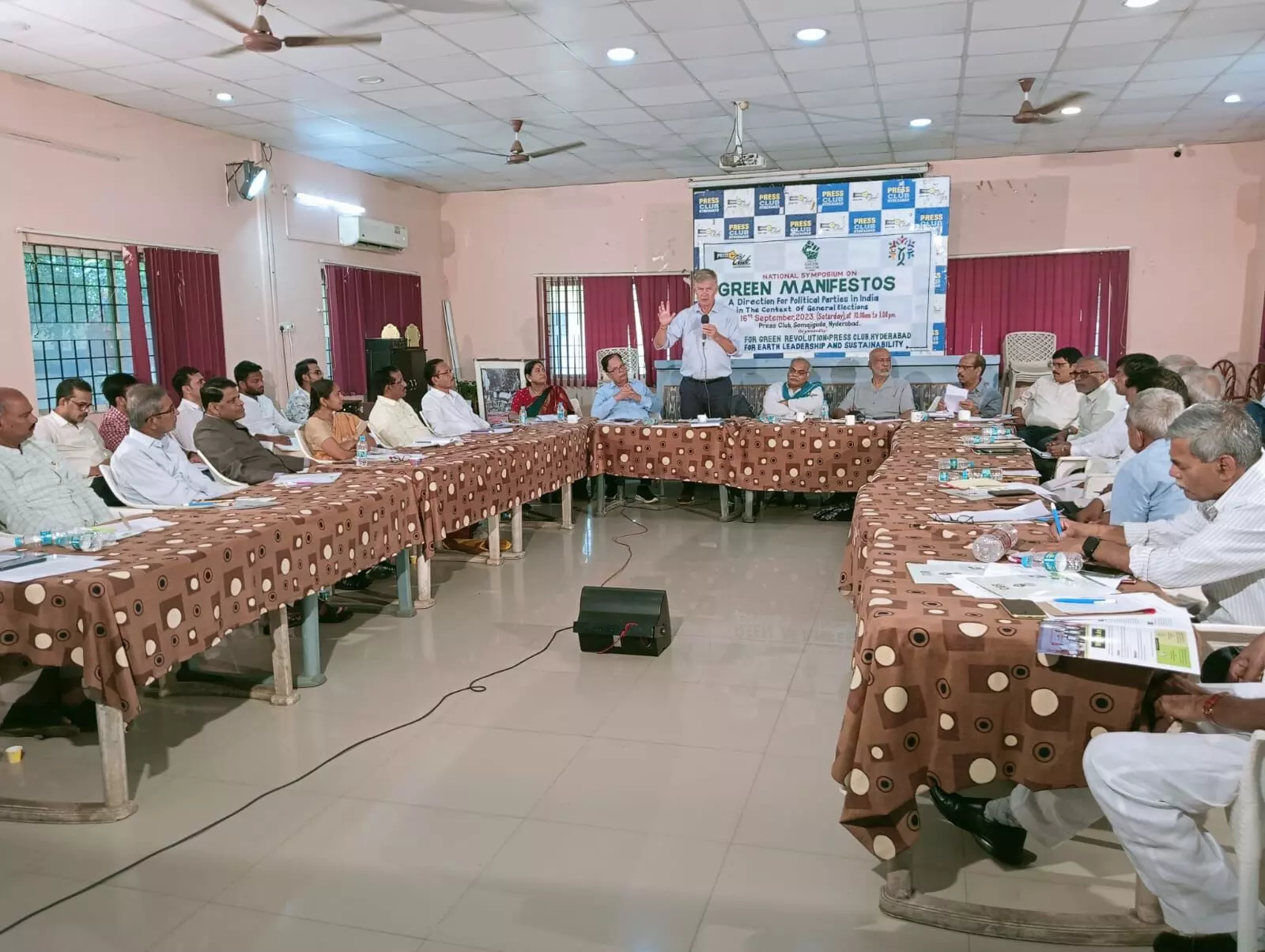Hyderabad environmentalists root for Green Manifestoes in upcoming polls
The need for a green manifesto becomes inevitable in the backdrop of several environmental challenges that the country is facing
By Sulogna Mehta
Hyderabad: Eco-friendly organisations in Hyderabad have urged the political parties to focus on ‘going green’ in their election manifestoes for the upcoming general elections in Telangana State and others.
On Saturday, members of the Council for Green Revolution (CGR) and the Council for Earth Leadership and Sustainability (CELS), in association with the Press Club of Hyderabad, held a symposium in the city to discuss the possibilities of ‘greening the manifestoes of political parties’, their current role in setting agenda for transition and change towards sustainability in India and the experiences of green parties in other countries.
As per the organisers, since India is entering a year of elections, in 2023 and in 2024, it is necessary to make the political parties and political leaders acknowledge the links between the environment, ecology, economy and social conditions by mainstreaming environmental issues in the manifestos.
Time right to formulate plans
The need for a green manifesto becomes inevitable in the backdrop of several environmental challenges that the country is facing. According to the Centre for Science and Environment (CSE), in the first nine months of 2022, India experienced almost one extreme weather event per day.
“We came up with a general framework to provide orientation to political party manifestoes and efforts to green them, specifically in the next year, in connection with the upcoming general elections and ongoing climate disasters. We are at a defining political moment where the decisions we make today can decide the future of the coming generations and the kind of life they can have. We need transformative policies that are framed by sustainability, equity, and justice and inclusive within the limits of ecology, nature and environment,” said environmentalist KP Reddy.
A political manifesto – usually released before the elections – is used as a guidance document that informs voters of the actions promised by respective political parties in the elections.
“There is competition among political parties in India to promise direct benefits to voters. Also, there is not much variation between the manifestoes of different political parties. India has two options: green political parties or green manifestoes,” said public policy expert, D Narasimha Reddy.
Environmental threats
The organisers deliberated on climate change, which is threatening Indian agricultural production, forests, water resources and rural economies, among others. These threats have significant implications not just for farmers, agricultural labour, and tribals, but for all Indians.
Farmers across India are already feeling the pressures of a changing climate and its effects on weather, with flash floods, unusual rains, increasing pest attacks and yield fluctuations. Livelihoods, lives and property damage apart, economic losses are mounting.
The rural economy is in a severe crisis. Rural livelihoods, especially, farmers continue to face structural issues in accessing institutional credit, seeds, fertilisers and markets. Food diversity in villages has drastically changed. The availability of food has also reduced.
However, political parties continue to remain oblivious to the troubles of ordinary people, bypassing references to natural disasters and the resultant impacts on food, livelihoods and life in general, said economist Mohan Guruswamy and public policy expert Narasimha Reddy.
Green Parties in Europe struggling to find power
Long ago, ‘green parties’ were considered as one of the options in India. However, it most probably be a distant dream. Europe has a long history of green parties but they are struggling to gain power.
In environmentally conscious Scandinavia, Norway’s Green Party got 3.8 per cent of the vote share. The Green Party in Germany had to support a coalition, not able to form its own government but managed to become the country’s third-largest party.
In the 2019 Danish elections, the only environmental party, The Alternative, actually lost half of its seats, said Norwegian diplomat Erik Solheim at the meeting.
Solheim also said that major economies including India, China, Europe and America should work together to make a positive change in the environmental sector.
Among those who took part in the symposium included Prof K Purushotham Reddy, environmentalist; Mohan Guruswamy, economist; R Dileep Reddy, former commissioner (RTI-A); Dr Narasimha Reddy Donthi, public policy expert; Erik Solheim, Norwegian diplomat and former politician; and L Venugopala Naidu, president of Hyderabad Press Club.